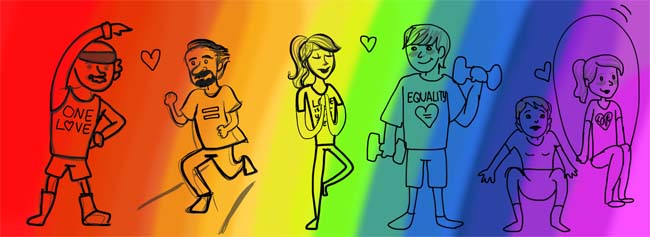According to U.S. News and World Report, the College of William and Mary ranks No. 1 in undergraduate teaching for public universities, third only to Dartmouth College and Princeton University overall. This should be a point of pride for the College. However, the College’s ability to educate students is only as good as the quality of its faculty. The College can only continue to attract high-caliber faculty if it offers wide-ranging benefits, including those that take into account same-sex domestic partnerships. While faculty and administrators have taken charge in demanding these benefits, the commonwealth of Virginia remains embarrassingly deficient.
Currently, Virginia does not extend the same benefits to the partners of public employees in same-sex domestic partnerships as it does to the spouses of its married employees. Given that the College is a public university, its faculty and staff fall under the category of public employees and cannot receive same-sex domestic partner benefits. This is wrong, and it will hurt the College.
Last year, the University of Tennessee conducted a study looking at the same-sex domestic partnership benefits offered by the top 26 public universities, including the College. The study looked at benefits in six categories: health care, leave, financial assistance, insurance, counseling and campus services. More than half of the universities offered at least one service in each category. Due to Virginia’s law, the College offers nothing in any of these categories. Discussing the ethical obligation of providing each of these benefits would be redundant, but it would be prudent to draw attention to a few areas.
Virginia does not allow the College to extend paid leave to faculty in same-sex domestic partnerships who are caring for sick partners. This difference in policy pertaining to domestic partnerships and heterosexual marriages is discriminatory and forces faculty to choose between financial security and obligations to their loved ones. The College should not have to place this pressure on families.
Dealing with the death of a loved one is stressful to say the least. That the commonwealth compounds that grief by depriving faculty of paid bereavement leave for the death of a partner is wrong. The vast majority of the top 25 public universities — 17 out of 25 — provide this common-sense benefit, and there is no reason why Virginia’s public colleges should not.
Finally, 20 of the 25 universities in the University of Tennessee’s study extended at least some form of health insurance to same-sex domestic partners of faculty members. It cannot be stressed enough how unfair Virginia’s current policy is. The College’s former rector, Jeffrey Trammell ’73, made a powerful economic case against this policy, but there exists a moral one that is equally strong: The policy is discriminatory and inconsistent with the values of the College’s students, faculty and administrators.
The College ought to be proud of its faculty. The Faculty Assembly — which is composed of representatives from each academic department — unanimously passed a resolution Sept. 24 demanding that Virginia allow its public universities to provide benefits to same-sex domestic partners of faculty. Not only are the College’s faculty members some of the best in the nation, but they stand up for each other. This solidarity in support of same-sex domestic partner benefits will be critical in the years to come.
Abby Boyle recused herself from this staff editorial to remain unbiased in her reporting.




































